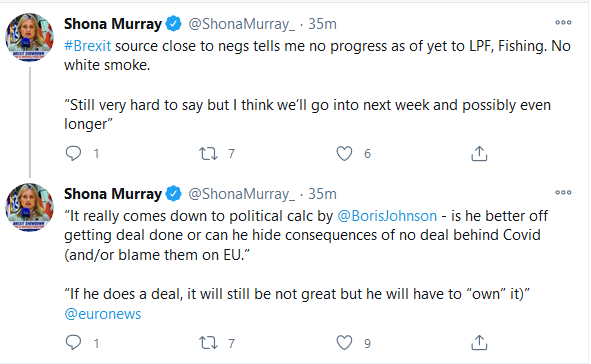
Either
1/ How do we cope with access to fishing waters in no-deal;
(see e.g. ec.europa.eu/info/sites/inf…)
or
2/ How far can we go in a final deal haggle
Which means
We're still no closer to knowing whether deal or no-deal
1/ How do we cope with access to fishing waters in no-deal;
(see e.g. ec.europa.eu/info/sites/inf…)
or
2/ How far can we go in a final deal haggle
Which means
We're still no closer to knowing whether deal or no-deal
https://twitter.com/tconnellyRTE/status/1332003402352615429
There are many reasons in a negotiation, at this stage, you may want an urgent meeting. Let us say the UK offered the EU a final deal, same fish for a transitional period, no further on Level Playing Field. The EU say no. Need to clear with Member States?
https://twitter.com/AIDANTURNER4/status/1332008648667762693
That's just an illustration though, we don't know, until one of the well placed folk gets to find out what's happening. But it does feel like, finally, the next few days will see a deal / no deal decision point on UK-EU talks.
An alternate theory. Equally plausible. In which case the EU Fisheries Ministers have to sign off on reduced access to UK waters.
https://twitter.com/BestForBritain/status/1332007132967940096
On balance, an emergency meeting of fisheries ministers at this point more likely good than bad news for a UK-EU deal. As is radio silence, for a change, from London. But a number of parts to a deal, and PM may still not have decided
https://twitter.com/HenryTanguy/status/1332014598124417025
And now a conflicting report. Aagh, this is what happens towards the end of negotiations.
https://twitter.com/JamesCrisp6/status/1332014216128106496
• • •
Missing some Tweet in this thread? You can try to
force a refresh




